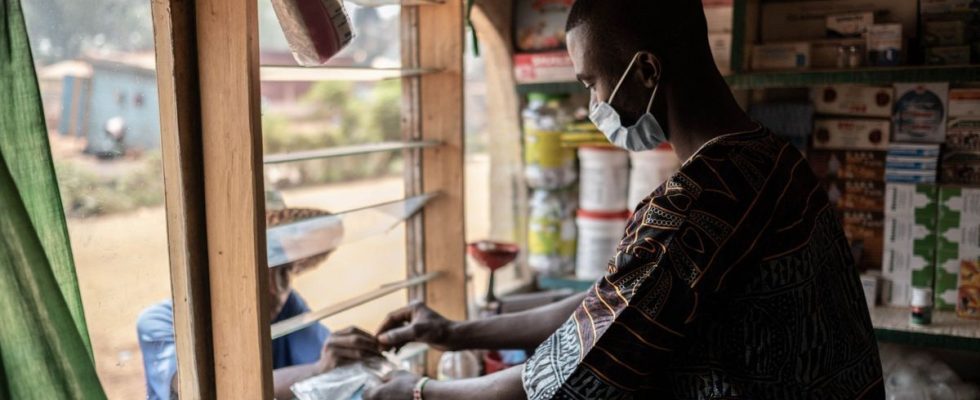Published on
Updated
Reading 3 mins.
Yaguina Nesly waits in front of a sheet metal shack summarily painted in white and green, one of the many wild pharmacies in Bangui, the capital of the Central African Republic, illegal but for the time being tolerated.
“I always buy my medicine here, because in the hospital you can only consult if you are lucky“, blows the young woman of 23 years. “I prefer to come to the +docta+ in the neighborhood“, a nickname that designates the tenants of these pharmacies, “it’s faster and cheaper“, she explains.
Stephen Liosso-Pivara-Bembe, 33, gives him tablets for stomach pain. In a white coat, stethoscope around his neck, he says he was never able to complete his medical studies for lack of money. He works seven days a week in this pharmacy decorated with drawings of yellow capsules. A slogan in white letters proclaims: “Health above all”.
These informal pharmacies are vital for the poorest population of this Central African country, the second least developed in the world according to the UN and in civil war for 10 years. But there is a flip side to the coin: proliferation of poor quality or fake drugs, resistance to antibiotics, illegal practice of medicine…
In the absence of an official census, AFP was able to count a dozen of these “mini-pharmacies” on Avenue de France alone, a major thoroughfare in a disadvantaged neighborhood, in front of which long queues form daily. , especially at the end of the day.
Access to care is very limited in this country which suffers from a chronic shortage of qualified health personnel, equipment and medicines.
The health system is under a drip of international aid, and about 70% of medical services are provided by humanitarian organizations, when 2.7 million people, half of the population, need health assistance, estimated the UN in 2022.
Free consultations
In the 5th arrondissement, Antoine Bissa, a 39-year-old nursing student who has not yet graduated, is installed between the medicine shelves of his shop called “Bibi pharma”.
He says he receives a hundred people every day “for injections or for medication, until 11 p.m.“. An activity which constitutes his only source of income, specifies this father of four children.
Most come to treat malaria, fever, for antiparasitic treatment, or first aid, he lists.
It also offers “free consultations”, and “cheaper drugs“. But, “if it is serious, they are referred to the hospital for further care“, specifies Antoine Bissa.
Gilles Doui came to relieve muscle pain. “I have three children and my salary does not allow me to pay for drugs in pharmacies“, says this 35-year-old civil servant who is waiting for his turn on a bench and “prefer to pay for a few tablets rather than a whole box“.
“We sell the drugs according to the means of each“, individually if necessary, details Stephen Liosso-Pivara-Bembe, who sells for example the box of Vogalène 5,000 CFA francs (7.5 euros), against 7,000 (10.5 euros) elsewhere.
Without recognition from the authorities, nor authorization to practice, he says he gets his supplies from Cameroon, the Congo but also from France.
Necessary regulation
“We do not work in partnership with mini-pharmacies“, tance Romuald Ouefio, Director of Pharmacy and Traditional Medicine at the Ministry of Health. “They are in the informal sector and promote the proliferation of substandard or falsified medicines“, he denounces.
Mr. Ouefio also points to “cases of resistance to antibiotics”.
“We are planning a dialogue in a few months with the owners to make them aware of converting to other activities.“, a first step before “a very robust repression”, he warns.
Jules Dawili, a laboratory technician from Bangui, admits that cases of resistance to antibiotics, in particular to amoxicillin, for bacterial infections, and to doxycycline, for the preventive treatment of malaria, are due to these over-the-counter sales or to poor requirements.
But he does not support “100% the regulation” announced by the authorities.
“Some are competent“, he nuances, considering that “the government could select them, give them tests and training to help health workers“.
The government mustthink carefully about the system he wants to put in place. In a district, there can be more than 20 mini-pharmacies, how many structures will he set up with what quantity of drugs and how many staff to replace everything?“, asks Stephen Liosso-Pivara-Bembe.
“If the government closes the mini-pharmacies, it is because it does not think of those who cannot afford to pay, many will die“, worries Yaguina Nesly, her 9-month-old baby wrapped on her back.
